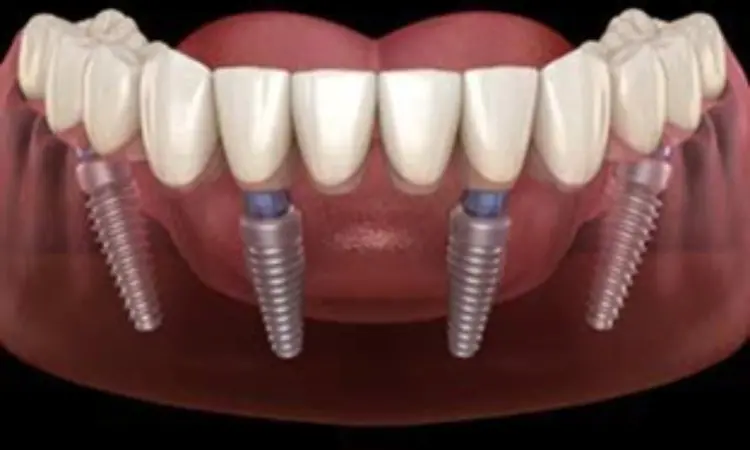- Home
- Medical news & Guidelines
- Anesthesiology
- Cardiology and CTVS
- Critical Care
- Dentistry
- Dermatology
- Diabetes and Endocrinology
- ENT
- Gastroenterology
- Medicine
- Nephrology
- Neurology
- Obstretics-Gynaecology
- Oncology
- Ophthalmology
- Orthopaedics
- Pediatrics-Neonatology
- Psychiatry
- Pulmonology
- Radiology
- Surgery
- Urology
- Laboratory Medicine
- Diet
- Nursing
- Paramedical
- Physiotherapy
- Health news
- Fact Check
- Bone Health Fact Check
- Brain Health Fact Check
- Cancer Related Fact Check
- Child Care Fact Check
- Dental and oral health fact check
- Diabetes and metabolic health fact check
- Diet and Nutrition Fact Check
- Eye and ENT Care Fact Check
- Fitness fact check
- Gut health fact check
- Heart health fact check
- Kidney health fact check
- Medical education fact check
- Men's health fact check
- Respiratory fact check
- Skin and hair care fact check
- Vaccine and Immunization fact check
- Women's health fact check
- AYUSH
- State News
- Andaman and Nicobar Islands
- Andhra Pradesh
- Arunachal Pradesh
- Assam
- Bihar
- Chandigarh
- Chattisgarh
- Dadra and Nagar Haveli
- Daman and Diu
- Delhi
- Goa
- Gujarat
- Haryana
- Himachal Pradesh
- Jammu & Kashmir
- Jharkhand
- Karnataka
- Kerala
- Ladakh
- Lakshadweep
- Madhya Pradesh
- Maharashtra
- Manipur
- Meghalaya
- Mizoram
- Nagaland
- Odisha
- Puducherry
- Punjab
- Rajasthan
- Sikkim
- Tamil Nadu
- Telangana
- Tripura
- Uttar Pradesh
- Uttrakhand
- West Bengal
- Medical Education
- Industry
Full-mouth rehabilitation with dental implants viable option for patients with cognitive and physical disabilities: Study

UK: A 14-year cohort study published in the Journal of Prosthetic Dentistry has found implant-supported prostheses to be effective and that oral rehabilitation under the specified conditions is stable.
The researchers suggest that clinicians should consider this full-mouth rehabilitation with dental implants under general anesthesia (GA) as a viable option for cognitively and physically disabled patients who might traditionally be excluded owing to perceived risks.
Oral rehabilitation with implants is an alternative to the provision of removable dentures in all patients for whom missing teeth require replacement. However, individuals with mental health, cognitive issues, and/or physical disabilities are often excluded from implant-supported prostheses due to the high perceived failure risk linked to poor oral health, systemic conditions, or the presence of parafunction.
Against the above background, Marie-Sophie Bogner, Guy´s & St Thomas´ NHS Foundation Trust, London, United Kingdom, and colleagues aimed to describe the outcomes, protocols, and survival rates of oral rehabilitation with implant-supported prostheses in patients with physical and cognitive disabilities treated under GA in a French unit of Special Care Dentistry.
For this purpose, the researchers conducted a retrospective cohort study on patient files. Data included demographics and information about the prosthetic and surgical phases of rehabilitation. Radiological and clinical reports were retrieved to establish the success, survival, and failure rates of implant placement as per the Health Scale for Dental Implants (HDSI) classification.
Two hundred ninety-eight dental implants had been placed under general anesthesia in 57 patients between 2007 and 2021.
The researchers reported the following findings:
- The prevalence of technical and biological postoperative complications was 14% and 13%, respectively.
- Thirty implants were determined to be failures.
- The estimated survival time in the population studied for loaded implants was 144.7 months.
- The cumulative survival rate was estimated to be 86% at 157 months.
To conclude, the study found implant-supported prostheses to be effective and that oral rehabilitation carried out under the conditions described was determined to be stable.
Reference:
Bogner MS, Chambas V, Veyrune JL, Faulks D, Hennequin M. Oral implant rehabilitation under general anesthesia for patients with cognitive and physical disabilities: A 14-year cohort study. J Prosthet Dent. 2024 Jan 30:S0022-3913(24)00012-X. doi: 10.1016/j.prosdent.2024.01.012. Epub ahead of print. PMID: 38296761.
Dr Kamal Kant Kohli-MBBS, DTCD- a chest specialist with more than 30 years of practice and a flair for writing clinical articles, Dr Kamal Kant Kohli joined Medical Dialogues as a Chief Editor of Medical News. Besides writing articles, as an editor, he proofreads and verifies all the medical content published on Medical Dialogues including those coming from journals, studies,medical conferences,guidelines etc. Email: drkohli@medicaldialogues.in. Contact no. 011-43720751


